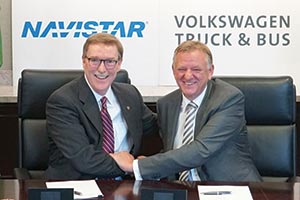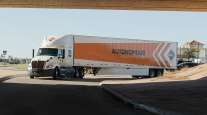Navistar, Volkswagen Seal $256 Million Alliance Deal

The deal was completed Feb. 28 and announced March 1 after the government regulators approved the transaction.
“We never doubted it would close. The final approval was not in the U.S. or Europe but in one of the other places where we both do business,” Navistar Chairman and CEO Troy Clarke said in an interview shortly after the transaction was completed.
The deal gives Navistar three separate major owners that collectively own about a half of the original equipment manufacturer: Carl Icahn, Mark Rachesky and VW. Icahn and Rachesky have had two seats each on Navistar’s board of directors, and now VW also has two.
Joining the board are Truck & Bus CEO Andreas Renschler and Chief Financial Officer Matthias Grundler. Clarke said they joined the board Feb. 28, raising membership to 12 people.
Renschler is the former head of the Daimler AG global truck division, the world’s largest heavy-duty truck maker.
VW’s two major heavy truck brands in Europe are MAN and Scania.
Clarke said the VW money will be used for general purposes and that it gives the parent of International trucks and engines some breathing room.
Clarke has been leading Navistar’s turnaround effort since 2013, during which time the company has carefully monitored cash reserves.
“We do manage cash specifically and deliberately,” Clarke said. “We don’t anticipate using the money immediately, but it is good to plus-up our balances.”
Although very useful, the money is probably not the most important part of the deal. Clarke said the two companies remain separate, as VW owns only about one-sixth, but the two will collaborate extensively.
Most obvious is the new procurement joint venture, with the two OEMs pooling their purchasing power. Clarke said this will have three components: basic commodities, including oil, antifreeze and paints; components, such as fuel pumps; and finally, the development of future products.
“This is a longer thing, where technology and procurement overlap,” Clarke said.
Executives and managers from the two companies had been talking about how to proceed on a somewhat detached, conceptual basis. Now, Clarke said, they are also plunging into specifics.
Not only are engineers and other professionals working with each other on trucks and engines in Lisle and VW’s headquarters city of Braunschweig, Germany, but also on technology.
Clarke said Navistar and VW share an interest in connected vehicles, or the “digitization” of commercial vehicles, as the Germans call it.
“This is a huge area,” Clarke said of telematics for maintenance and customer service, and technology for active safety systems, autonomous driver assistance and platooning.
“There’s as much excitement here [in technology] as in the greasy bits” of oil filters and wheel ends.
Technological advancement was sometimes difficult as a stand-alone company, Clarke said. That could mean prioritizing between developing a new cab and working on emissions regulations.
“Now we have enough for both,” he said. “It’s great having a partner who looks at things the same way we do.”




